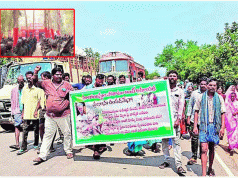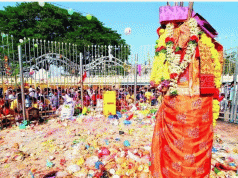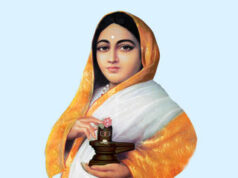“We should not be ashamed of talking about India’s indigenous contributions in science,” says A Jayakumar, (VIBHA), the science and technology wing of the Rashtriya Swayamsevak Sangh (RSS), adding, “There had been deliberate attempts by the past governments to ignore our contributions. The truth should come up.”
Previously known as Swadeshi Science Movement, VIBHA wants the Narendra Modi-led NDA government to proactively chart policy to initiate research and development (R&D) in the field of India’s indigenous scientific achievements in the past (read ancient period). It is also seeking amendments in the new National Education Policy.
A mechanical engineering graduate and an MBA, Jayakumar had been a long-time sangh pracharak. He speaks with the Firstpost on various aspects of promotion of swadeshi science. Edited excerpts:
What are VIBHA’s plans to create awareness on swadeshi science and technology among students?
VIBHA has been working towards popularising, propagating and creating awareness about India’s indigenous contributions in the field of science and technology amongst students. Nothing much has been done by previous governments in this direction. As a result, students have been found to be losing interest in pure science. While the number of engineering and medical graduates has been increasing, year after year, it’s just opposite in applied science and technology streams. Days are not far when we may have to import scientists due to a dearth of top R&D institutions (in India). This is not a presumption but studies have shown this trend.
We’ve asked the government to emphasise on developing innovative technology that can be used for common masses. The need is to tell our young students about the rich scientific heritage of India and its contribution. It should be a part of the syllabus. Besides, collaborating with Vijnana Prasar — an autonomous body under the department of science and technology — we’re conducting a national examination, Vidyarthi Vijnana Manthan, for school students on 20 November to evaluate their knowledge on India’s contribution to science.
What’s this examination — Vidyarthi Vijnana Manthan — all about and how is it going to help students in future?
VIBHA has published two books — Indian contributions to science and Notes to myself: APJ Abdul Kalam, which will help students know about India’s heritage in science and inspire them. Much before Galileo and other Western scientists, Aryabhatta revealed astronomical facts 1,500 years ago without using scientific instruments. It speaks of the genius India had. Though this examination started four years’ ago, this time we’re going on a large-scale, as more than 2,000 schools (62 schools in Delhi) will be participating in it at 1,130 centres. After selecting 240 winners at state-level, 18 students will finally be selected at the national level. These winners will be provided mentors and every student will get an opportunity to select a mentor of his or her choice. Based on the area of interest, students will be taken on a 10-15 day visit to R&D institutions. We’re also planning for scholarships in future.
Are you planning to design any curriculum for the school students in the science stream? Is it going to be different from what is taught across the country at present?
We have sought a few amendments in the syllabi of Class 5 to 12, as the new education policy is not comprehensive. We have asked to include India’s indigenous scientific development, contributions in Ayurveda, Yoga, Vaastu-Shastra, Indian way of bio-diversity, etc. The government needs to do more in R&D of Ayurveda. Now, this stream of medicine is the last choice, whereas, in the West, it’s in big demand.
RSS has often been accused of saffronising India’s education system by imposing its ideology. Will VIBHA’s initiatives fall prey to the same attack?
Here I want to clarify that RSS never interferes in any government policy. Nobody can saffronise or colour a scientific aspect, because science is neutral and based on facts. The science fraternity does not get carried away by politics or political ideologies.
We don’t have concrete records of scientific achievements in ancient India. Even, if it’s true, how is it going to help students who are studying modern science?
Personally, I’m against propagating claims made in Puranas or elsewhere without any scientific base. But, simultaneously we shouldn’t be hesitant in talking about our proven scientific achievements. Like that of Aryabhatta or Varahmihir. Centuries ago Indian mathematician and astronomer Madhava of Sangamagrama invented the infinite series which James Gregory later developed (known as Gregory series) in 1667. In Germany, it’s taught as Madhav-Gregory series, contrary to India whereas students are taught only as Gregory series. We want that the truth behind India’s scientific achievements and contributions should be known globally, rather than keeping it concealed as happened post-Independence. Unlike, China, we are still continuing with the baggage of British rule. While China could promote its traditional Chinese medicine globally in a big way, India failed to do so with its Ayurveda. It’s a sorry state of affair.
Despite references to astronomy, metaphysics, atom, Pushpak rath (aircraft), missiles, Brahmashtra (lethal weapon of mass destruction), plastic surgery, etc, in ancient texts, it is the modern Western science that has actualised these concepts. Why did scientific progress stop in ancient India after achieving those levels?
We had lakhs of manuscripts on scientific inventions — a major part of it is with Germany. We have developed a Traditional Knowledge Digital Library, but why no research has been initiated? Once, APJ Abdul Kalam had told me that unless government initiates R&D on traditional knowledge, it would be limited to lectures only and make claims. The society won’t be benefitted. The government should ensure that research work is initiated in the state-of-the-art research centres in the country. The truth should come out.
Why is it that even after seven decades of Independence, no progress has taken place in teaching and research in advanced science and technology in India in Sanskrit or vernacular languages?
If any language fails to deal with science, it’ll die. Sanskrit is the only Indian language that dealt with higher level of science. VIBHA is propagating science in regional languages. We are conducting this science examination in regional languages as well.
Do you think the governments in the past deliberately ignored it?
Yes, there had been deliberate attempts by the previous governments to ignore India’s indigenous contributions in science and technology. No priority and importance was given to it. No one wanted India to be a self-reliant country. Our ancient achievements can’t be dumped as a hoax, without finding out the truth.
By Debobrat Ghose
Courtesy: Firstpost.com














